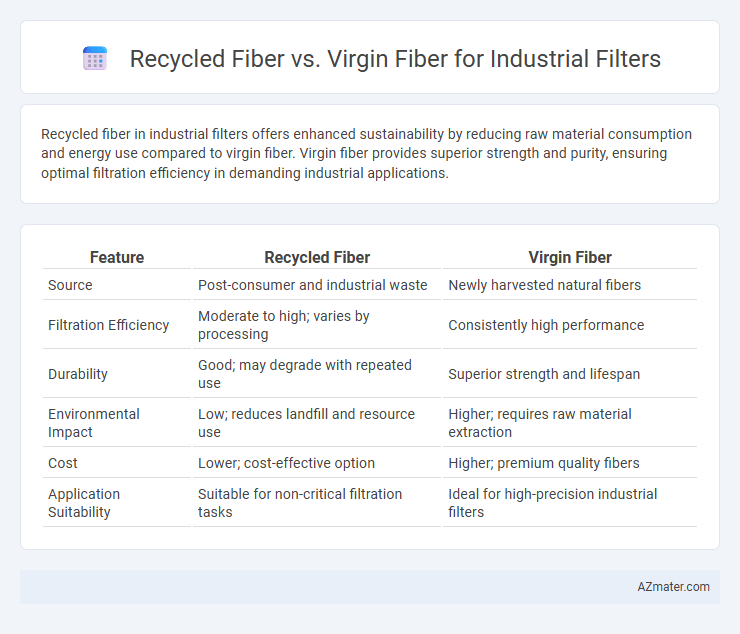Recycled fiber in industrial filters offers enhanced sustainability by reducing raw material consumption and energy use compared to virgin fiber. Virgin fiber provides superior strength and purity, ensuring optimal filtration efficiency in demanding industrial applications.
Table of Comparison
| Feature | Recycled Fiber | Virgin Fiber |
|---|---|---|
| Source | Post-consumer and industrial waste | Newly harvested natural fibers |
| Filtration Efficiency | Moderate to high; varies by processing | Consistently high performance |
| Durability | Good; may degrade with repeated use | Superior strength and lifespan |
| Environmental Impact | Low; reduces landfill and resource use | Higher; requires raw material extraction |
| Cost | Lower; cost-effective option | Higher; premium quality fibers |
| Application Suitability | Suitable for non-critical filtration tasks | Ideal for high-precision industrial filters |
Introduction to Industrial Filter Fibers
Industrial filter fibers are essential for capturing contaminants in various manufacturing and environmental processes, with recycled fiber and virgin fiber serving as primary material options. Virgin fibers offer superior strength, consistency, and purity, making them ideal for high-performance filtration applications requiring durability and precise particle retention. Recycled fibers provide a sustainable alternative by reducing environmental impact and lowering material costs, but they may offer less uniformity and filtration efficiency compared to virgin fibers.
What Are Recycled Fibers?
Recycled fibers in industrial filters are regenerated materials derived from post-consumer or post-industrial waste, such as used textiles, paper, and plastics, processed to meet filtration standards. These fibers offer sustainable alternatives to virgin fibers by reducing raw material consumption and lowering environmental impact while maintaining comparable filtration efficiency and durability. The choice between recycled and virgin fibers depends on application-specific requirements, but recycled fibers contribute significantly to circular economy goals in the industrial filtration sector.
Understanding Virgin Fibers
Virgin fibers in industrial filters originate from freshly harvested raw materials, ensuring superior strength, uniformity, and impurity-free composition, which enhances filtration efficiency and durability. These fibers provide consistent pore size distribution, critical for maintaining optimal flow rates and contaminant retention in demanding industrial environments. The predictability and high-quality performance of virgin fibers make them the preferred choice for applications requiring stringent filtration standards and extended filter lifespan.
Fiber Source: Sustainability and Availability
Recycled fiber for industrial filters primarily originates from post-consumer and post-industrial waste, significantly reducing environmental impact by minimizing landfill contributions and conserving natural resources. Virgin fiber is sourced directly from sustainably managed forests or plantations, ensuring high purity and consistent quality but often involves higher energy consumption and deforestation risks. Availability of recycled fiber depends on local recycling infrastructure and supply chain maturity, whereas virgin fiber benefits from established forestry operations with more predictable supply but less sustainability appeal.
Performance Comparison: Filtration Efficiency
Recycled fiber in industrial filters often exhibits slightly lower filtration efficiency compared to virgin fiber due to variations in fiber integrity and potential contamination during recycling processes. Virgin fibers maintain consistent structural properties that enhance particle capture rates, delivering superior filtration performance in high-demand industrial applications. Despite minor efficiency trade-offs, recycled fibers offer environmental benefits without significantly compromising filtration standards required for most industrial uses.
Cost Analysis: Recycled vs Virgin Fiber
Recycled fiber for industrial filters offers significant cost savings due to lower raw material expenses and reduced energy consumption in production compared to virgin fiber. Virgin fiber, while often providing superior filtration performance and durability, incurs higher costs associated with resource extraction and processing. Evaluating the total cost of ownership, including maintenance and replacement frequency, demonstrates recycled fiber's potential to reduce overall operational expenses in industrial filtration applications.
Environmental Impact Assessment
Recycled fiber in industrial filters significantly reduces environmental impact by lowering energy consumption and greenhouse gas emissions compared to virgin fiber production. The use of recycled fiber decreases resource depletion, minimizes landfill waste, and reduces water usage throughout the manufacturing process. Lifecycle assessments demonstrate that filters made from recycled fibers offer a substantially smaller carbon footprint and improved sustainability profile in industrial applications.
Durability and Longevity in Industrial Use
Recycled fiber in industrial filters exhibits slightly lower durability compared to virgin fiber, which offers superior tensile strength and resistance to wear under high-stress conditions. Virgin fiber filters typically ensure longer operational life, reducing maintenance frequency and replacement costs in heavy-duty industrial applications. Choosing virgin fiber enhances filter longevity and reliability, critical for continuous industrial processes demanding consistent performance.
Market Trends and Regulatory Considerations
The industrial filter market increasingly favors recycled fiber due to rising environmental regulations and sustainability mandates, driving demand for eco-friendly filtration materials. Virgin fiber remains essential in applications requiring higher purity and performance standards, but its market share faces pressure from policies promoting circular economy and carbon footprint reduction. Regulatory trends such as the EU's Green Deal and extended producer responsibility frameworks emphasize recycled content, catalyzing innovation in recycled fiber filters while reshaping supply chain strategies.
Choosing the Right Fiber for Industrial Filters
Choosing the right fiber for industrial filters significantly impacts filtration efficiency and environmental sustainability. Virgin fiber offers superior strength, consistent pore size, and longer filter life, making it ideal for high-demand industrial applications requiring precise particle retention. Recycled fiber provides an eco-friendly alternative with cost benefits but may exhibit variable fiber quality and shorter lifespan, suitable for less critical filtration tasks where sustainability is prioritized.

Infographic: Recycled fiber vs Virgin fiber for Industrial filter
 azmater.com
azmater.com